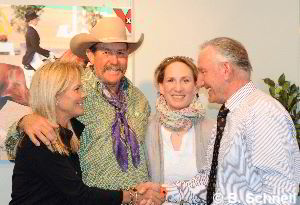|
|
"A Huge Honor for Us"
Linda and Pat Parelli Invited to Join Xenophon Society During Successful European Tour
(Ocala, FL, May 31, 2011, Parelli Press Release) – Linda and Pat Parelli, the founders of Parelli Natural Horsemanship, Inc., recently returned from a successful European tour where they demonstrated their training techniques in front of sold out crowds. The couple also met with Olympic gold medalist and dressage coach, Klaus Balkenhol, who expressed his approval of the Parelli’s natural horsemanship training by bestowing upon them membership in the Xenophon Society. The society was founded to preserve and promote the classical principles of dressage, and the Parellis were thrilled with their induction as their training methods reflect the basic principles of classical training.
“Pat and I train with dressage Master Walter Zettl and Walter encouraged us to meet Klaus and his family while we were in Europe. We not only met them but I ended up going to their farm to show how our method helps with behavioral issues,” Linda said. “While we were still in Europe, Klaus made us members of the Xenophon Society which was a huge honor for us.”
The Xenophon Society is named for the famous Greek author of The Art of Horsemanship, an ancient manuscript that describes the proper care and treatment of the horse. Many of the points made by Xenophon are still considered relevant to horse training today, and the Xenophon Society was founded to uphold these ideas of ethical and classical equestrianism.
The Parelli’s European tour drew sell-out crowds at Equitana in Germany and the Parelli Celebration in Birmingham, U.K. “It was a wonderful experience and we spent two whole days at our Parelli Celebration educating the crowd on Horsenality, a system we developed which helps horse owners understand the basic personality types of horses,” Linda said. “Just as people have personalities and are individuals, horses are the same but they have horsenalities. Some horses are extroverted, some introverted, some fearful and some dominant. We have developed a model that helps people understand the horsenality types, how they translate into horse terms, and how to handle each of those types.”
Linda added that the Horsenality program has taken the mystery out of why some horses are lazy, crazy, naughty or unpredictable. “If you understand your horse you can bring out the best in them. The European trip was exciting because it showed us that the Horsenality program has been embraced by riders all around the world and that it has made a huge difference in the lives of horses and riders.”
While in Europe, Linda also had the opportunity to travel to Spain and ride with Olympic Dressage rider Luis Lucio. “Luis was on the Spanish team that went to the Atlanta and Sydney Olympics. We met about seven years ago and he has spent time with us on our campus in Colorado. He incorporates a lot of our principles into his teaching. While I was with Luis he coached me on his top Grand Prix horses which is wonderful because it incorporates our Parelli principle that horses teach riders and riders teach horses.”
Linda said she also accompanied Lucio to a dressage clinic he was teaching in Zurich and was able to put the Parelli Natural Horsemanship techniques into practice. “There was a horse there with a serious problem because he would freeze up and then explode and the riders were scared to ride him,” Linda said. “I worked with him for a day-and-a-half and at the end of that time I was riding him around bareback. Everyone there could hardly believe it.”
Linda will return to the United Kingdom in July to teach a three-day course on the elements of what Linda calls “The Game of Contact,” an in-depth system which uses psychology and Parelli principles to help riders teach horses to reach for or take the contact with the bit. It is especially valuable in the sport of dressage where contact is such an important part of the discipline. Linda developed the Game of Contact to communicate the knowledge she has developed from her dressage training sessions with Zettl.
“Natural horsemanship techniques really help the dressage rider work on relaxation, as well as increasing harmony and connection with their horse to create a more positive relationship. This can translate into a natural foundation for performance,” Linda said.
|

|
|
|
|
|
|
|
|
|
